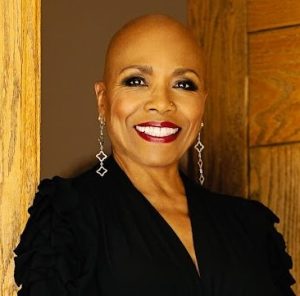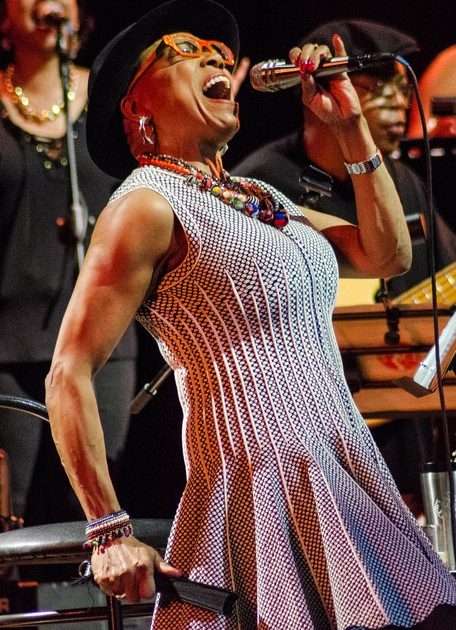Meeting the Challenges of the New Year’s Changes: Club Offerings from Dee Dee Bridgewater, Jeannette Miller, Sarah Anne Fernandez, and William Ryall
We’re back! And in the first month of this new year, we saw a diverse group of offerings at local clubs: some quite inspiring. So, let’s get right to them!
Dee Dee Bridgewater: Rallying for Courage
To say that 2025, so far, has been a challenge for many of us is putting it mildly. Anticipation about what lies ahead has provoked feelings of anger, fear, and—maybe worst of all—powerlessness.
So, how do cabaret and jazz performers meet the challenges that these changes present? Some make brief references to the tumult, finding musical material that stresses the importance of turning to our communities for support and solace. Others more or less ignore the changes, choosing instead to give listeners a welcome respite from all things political.

(Photo: Kimberly M. Wang/Eardog Prods.)
Then there’s Dee Dee Bridgewater. Daring in the best of times, this seasoned jazz performer makes it clear that while, yes, we need to support and connect with one another and find escape hatches for avoiding despair, we also need to strive to stay engaged and determined. In her recent Birdland show, she presented stirring if often uncomfortable-to-hear songs that encouraged us to keep our fighting spirit. Bridgewater performed with fellow members of the We Exist! quartet, which features keyboardist Carmen Staaf, bassist Hannah Marks, and drummer Shirazette Tinnin.
A large part of the show featured songs written and/or performed by Black American women singers: Abbey Lincoln, Nina Simone, and Billie Holiday. Lincoln’s songs seemed top priority. Bridgewater remarked that she’d only recently felt the time had arrived for her to sing these selections.
Among the titles written by Lincoln, “Throw It Away” was a standout, offering powerful assurance. Bridgewater encouraged audience members to sing along with a repeated lyric: “You can never lose a thing if it belongs to you.” The song’s arrangement was quiet, rolling, and hypnotic, providing just the right setting for its message, while also showcasing the singer’s exemplary musicianship. At least as effective was “And It’s Supposed to Be Love”—which took on a feisty, agitated Jamaican rhythm at times, full of sardonic mockery. (“It’s a sad and scary scene / With no grace at all. And it’s supposed to be love.”)
Simone’s “Four Women” was, perhaps, the show’s centerpiece. Here we experienced Bridgewater’s fearlessness when it comes to using her voice in unexpected ways: blending various vowels into novel diphthongs and seemingly coining consonants previously unheard by human ears.

(Photo: Niccolo Bruna/nicbruna.tv)
“This is some Billie Holiday heavy,” Bridgewater said as she introduced her rendition of Abel Meeropol’s “Strange Fruit,” which was fashioned after a Bettye LaVette. arrangement. Her singing of the unspeakable in the song’s famous depiction of a lynching ended with gasping and sobbing sounds from the singer, while Staaf’s keyboarding provided the groan of a church organ turned sinister.
After a driving version of Bob Dylan’s “Gotta Serve Somebody,” Bridgewater struck a more upbeat tone in the show’s final stretch with a mashup of Leslie Bricusse’s and Anthony Newley’s “Feeling Good” (popularized by Simone) and James Brown’s “I Got You (I Feel Good).” So fitting to have been served Brown’s rocking hymn of human joy following the cathartic release Bridgewater had given us.
This was an event that felt less like a show and more like a bracing call for courage and optimism, at a time when both are in short supply. I needed it, and I loved it.
Presented at Birdland, 315 W. 44th St., NYC, January 22-25, 2025.
Jeannette Miller: Phoenix from the Ashes

In Jeannette Miller’s rendition of Cole Porter’s “At Long Last Love” (the first selection from Everything Must Change, her recent show at Pangea), she sounded fine but not stunning. Her voice wafted through the room as if on a gentle zephyr, but she seemed a bit hesitant. However, in the middle of her second song—“I’ve Got the World on a String” (Ted Kohler, Harold Arlen)— the tide turned, and for the better.
I attribute the shift in part to an unexpected “ding!” sound, heard mid-song. This bell tone might have come from somewhere outside of the show room or perhaps from the pocket of somebody who’d forgotten to silence their cell phone. I’m not sure. But it came at precisely the right split second and on exactly the right pitch. The serendipity of it made Miller smile, and she seemed to turn her performance up a few notches afterward.
What impressed me the most about this show was Miller’s ability to take a jazz performer’s laid-back, improvisational approach, all while presenting a strong cabaret-show narrative consisting of spoken narrative episodes told between songs. Noting the challenges of the new year, she told us about the crisis that she and her husband experienced in 2024, when they had to move out of their Brooklyn neighborhood following a fire that wound up destroying two nearby houses and proved fatal to one neighbor. (The incident happened when the two were vacationing in Southern California; Miller noted the irony that, as she was presenting the show in Manhattan in 2025, L.A. was enduring its own wildfire nightmare.)
Miller found appropriate songs to help her tell this story. Describing her return to NYC from California to witness how the fire had ravaged the neighborhood, she sang original lyrics set to Wayne Shorter’s 1966 instrumental composition “Footprints,” asking rhetorically: “Where are the lives that we spent with one another?”
She sang of recovery as well as of tragedy. A sprightly “Manhattan” (Rodgers & Hart) marked her and her husband’s move from Brooklyn to temporary housing in a Manhattan hotel in order to escape the stench from the fire scene. The latter part of the show centered on the questions of when (and whether) the couple would return to Brooklyn. After reminiscing about warming up one cold night, she brought out an elegant “You Must Remember Spring” (Michel Legrand, Marilyn and Alan Bergman), then segued into a bold, swinging “Bye Bye Blackbird” (Mort Dixon, Ray Henderson).
The earnest but good-humored Miller was supported by the bountifully talented pianist Arcoiris Sandoval and the accomplished bassist Yoshi Waki.
Presented at Pangea, 178 Second Ave., NYC, January 11, 2025.
Sarah Anne Fernandez: Consider the Bio-Musical
How are the legacies of real-life historical figures (specifically, female ones) altered or distorted when those figures wind up becoming characters in a musical? That question inspired the creation of Don’t Forget Me, Sarah Anne Fernandez’s recent show at Green Room 42 (directed by Rebecca Aparicio). Fernandez selected an array of such women, from Eve (yes, that Eve) in Children of Eden to Tamara de Lempicka in Lempicka, analyzing and also celebrating each one with a musical number. (An earlier version of the show was seen at Chelsea Table + Stage in March of 2024.)

Early in the show, Fernandez, known for portraying Elphaba in the National Tour of Wicked, sang “The OG Medley”: songs from Golden Age 20th-century musicals. Here, she showed impressive versatility as a singer. Her voice was consistently big, assured, and likable, and she made it work for characters as diverse as Annie Oakley (Annie Get Your Gun) and Anna Leowens (The King and I).
She then moved on to more in-depth evaluations—of characters from post–Golden Age shows. Or, make that slightly more in-depth looks. Because Fernandez was presenting segments for 15 characters in all, nuanced analysis just wasn’t feasible. Not enough time.
When it came to Oakley and to Funny Girl’s Fanny Brice, Fernandez remarked on how musical theatre’s depiction of their love lives may have eclipsed the presentation of their professional achievements. But she might have looked deeper at how some musicals centering on historical figures can actually clean up those figures’ biographies. Take Eva Perón in Evita, whom Fernandez commemorated with “You Must Love Me” (Andrew Lloyd Webber, Tim Rice), from the Madonna film version. I recall that, when the stage Evita was introduced, some viewers objected to what they saw as glamourization of a fascist. Did the musical actually give Perón’s shoddy reputation a break? Must we love her?
In any event, this show was truly entertaining from start to finish, thanks to Fernandez’s vocal talents and her impressive gift for holding the attention of her audience.
Another plus: the ensemble of musicians who gave the audience—when squinting with our ears—the impression we were hearing not a mere sextet but, rather, full, rich orchestral arrangements, straight from a Broadway house. These music-makers included pianist (and musical director) Sheela Ramish, guitarist Matt SanGiovanni, bassist Nic Mrakovcic, drummer Jesse-Ray Leich, cellist Sarah Overton, and violinist Brad Bosenbeck.
Songwriter Michael Mott created Fernandez’s opening number, “Her Story,” a stirring anthem with a feminist sensibility.
Presented at The Green Room 42, in Yotel, 570 10th Ave., NYC, January 13, 2025.
William Ryall: Giving His Regards (Plus Some Quibbles) to Broadway
William Ryall has a long and storied history of winning supporting roles and ensemble assignments in Broadway musicals, from glorious hits (Grand Hotel) to notorious turkeys (The Best Little Whorehouse Goes Public). There have been 15 shows in all—and all but one (Amadeus) were musicals. In his recent Chelsea Table + Stage show, Why Can’t I Walk Away? My 34 Years on Broadway (The Good, the Bad, & the Wicked, he celebrated his resilience in a profession in which only a lucky few find the success he has won. And yet, from the top of the show, when he was introduced as a “Tony Award Admirer,” Ryall embraced the role of underdog: striking a self-deprecatory tone, never letting his triumphant moments entirely obscure the difficulty of the work or the sting of numerous rejections.

In the first part of the heavily scripted show, he talked about his long pre-Broadway years, working in a series of relatively humble assignments, in summer stock, dinner theatre, and bus-and-truck touring companies. He shared not only career tales but also stories from his personal life, notably one ugly romantic breakup that left him with a bad case of hives, from which he recuperated on Fire Island with the help of friend Tommy Tune.
Blessed with a beaming smile; a deep, resounding voice; and the sense that he’s comfortable in his own skin, Ryall, supported by pianist Garrett Taylor, gave us effective takes on songs (or excerpts from songs) from shows in which he appeared, including “You’re a Mean One, Mister Grinch” (Albert Hague, Dr. Seuss) from Dr. Seuss’ How the Grinch Stole Christmas, and “Kiddy Widdy Winkies (The Childcatcher’s Song)” from Chitty Chitty Bang Bang (Richard M. and Robert B. Sherman). Some other selections were either from musicals in which Ryall did not appear on Broadway or were stand-alones, such as “After All” (Kim Over, Tom Toce).
His patter was entertaining. At one point, there was a quiz-show bit in which he shared a rapid-fire series of juicy anecdotes about some of his better-known co-performers. It was lively, amusing, and well-received, even if its gossipy “tell-all” aspects didn’t exactly appeal to our better angels.
Late in the show—although he’d spoken warmly about finding true and lasting love with a life partner and, later, a daughter—Ryall revisited that hive-inducing toxic romance from the distant past. Plus, he told of a fairly recent career setback that gave him considerable bitterness. This downbeat double whammy cast a bit of a pall over the proceedings, but he narrowly avoided a wipe-out by closing the show with “I Was Here,” an anthem celebrating showbiz resilience, from Ahrens and Flaherty’s The Glorious Ones.
Presented at Chelsea Table + Stage, 152 W 26th St., NYC, January 27, 2025.
###
About the Author
Mark Dundas Wood is an arts/entertainment journalist and dramaturg. He began writing reviews for BistroAwards.com in 2011. More recently he has contributed "Cabaret Setlist" articles about cabaret repertoire. Other reviews and articles have appeared in theaterscene.net and clydefitchreport.com, as well as in American Theatre and Back Stage. As a dramaturg, he has worked with New Professional Theatre and the New York Musical Theatre Festival. He is currently literary manager for Broad Horizons Theatre Company.




